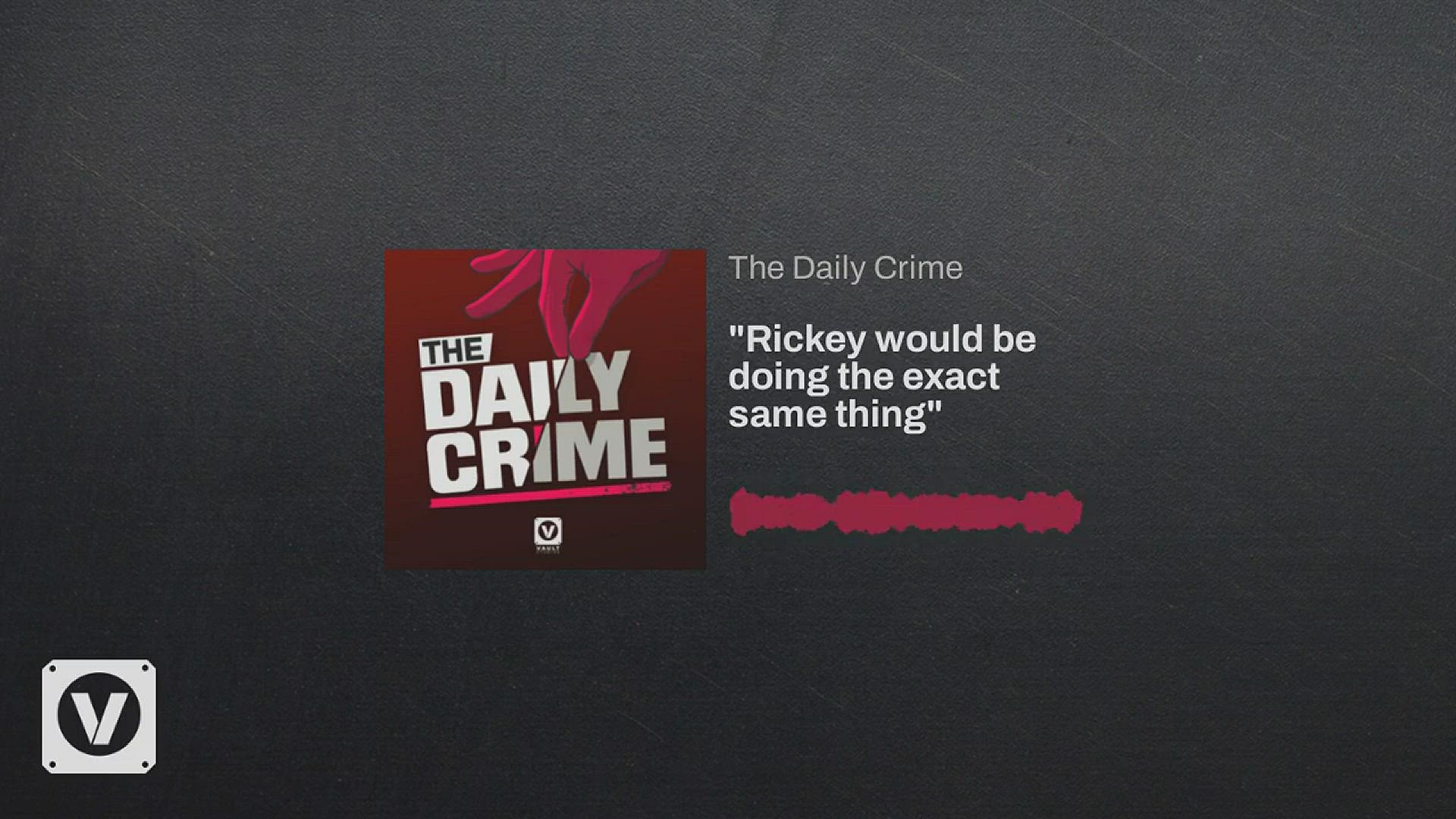INDIANAPOLIS — The following article contains major spoilers for the Apple+ TV limited series, ‘Black Bird.’
In one of the more disquieting scenes from Apple TV+’s limited series "Black Bird," suspected serial killer Larry Hall (Paul Walter Hauser) grabs one of 21 handmade wooden falcons, scattered across a homemade map of the Midwest peppered with red dots, and holds it up to a dim light.
"Do you know what they’re for James? They watch over the dead, they guard their spirits to make sure they’re okay," Hall coos over a soundtrack thick with ominous drone music.
The onscreen interaction, based on a real life exchange between Hall and James Keene (Taron Egerton), the drug dealer tasked with eliciting a confession out of him for a chance at freedom from a 10-year-prison sentence, caught viewer Judy Pflum's attention.
One of those red dots could have represented the final resting place of her daughter, 18-year-old Denise Pflum, who went missing in 1989.
"I was looking very closely to see where he put the dots in Indiana. But that may not have been factual. I know that. The show probably had exaggerated some things,” Pflum said.
For families and police departments in Indiana still dealing with the possibility that Hall may have had something to do with their loved ones demise though, there were multiple hair-raising moments in "Black Bird."
"As a resident of Indiana, it's unsettling to know that people like this exist and fly under the radar," said Detective Jonathan Eagan with the West Lafayette Police Department, who currently handles a missing person's case that could potentially be linked to Larry Dewayne Hall.
RELATED: Skeletal remains found almost 4 decades ago in Tennessee identified as missing Indiana child
Hall confessed to committing at least 35 murders throughout the Midwest and eastern United States, but slowly recanted all those confessions. The FBI currently suspects Hall may have committed at least 50 murders.
"Unless Larry Hall decides to start telling the truth. I don't think we're ever going to get any information from him that's going to be helpful," Pflum said.
If the uncertain scope of Larry Hall’s crimes makes for compelling TV - the series boasts a 97% on Rotten Tomatoes and was lauded as a "deliciously sinister," "true crime triumph" by critics – it's been a different story for the people whose lives he actually changed.
13News found multiple investigators across Indiana have had to consider Hall a suspect in homicide, missing persons, stalking or kidnapping cases at one point.
Hall confessed to murdering Pflum of Connersville and missing 20-year-old Tricia Reitler of Marion during interrogations, then recanted them.
A family member close to Hall maintained he murdered 20-year-old Michelle Dewey of Indianapolis, and authorities found an item containing the name of homicide victim Rayna Rison, 16, among his possessions.
But did Hall truly murder these women, as he once claimed? Or did he wish to insert himself into cases he already knew were happening in the community, as he also claimed.

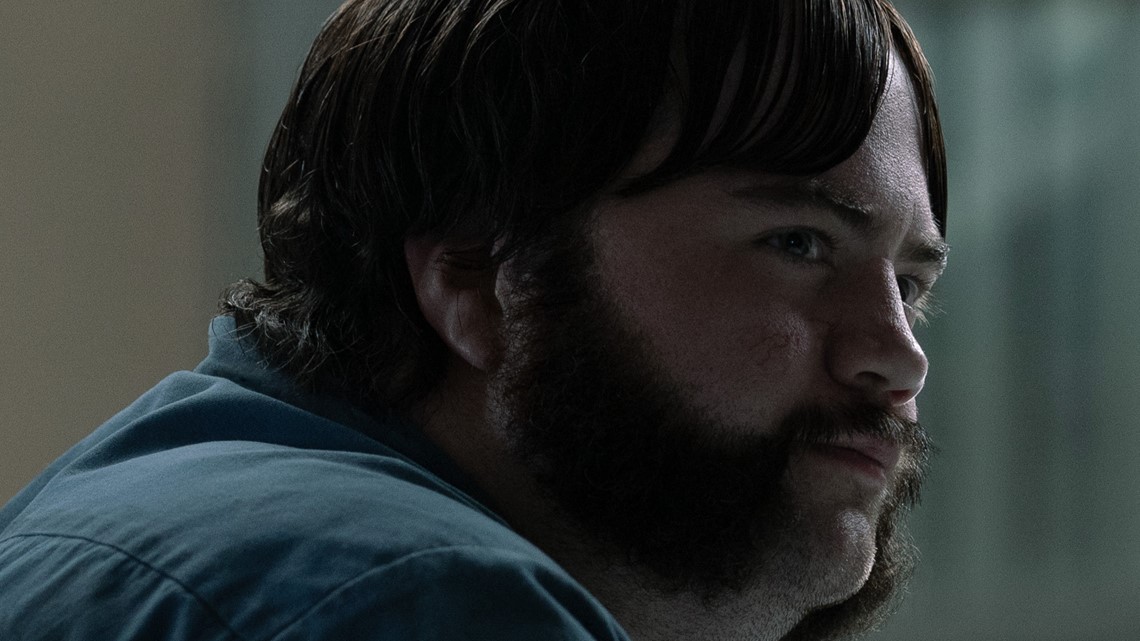
"If Hall did everything that Hall’s been accused of, he's one of the most prolific serial killers in the Midwest, if not the most. But he's made all these claims, and withdrew them,” said Detective Joey Laughlin with the Fayette County Police Department, who is still investigating the disappearance of Denise Pflum.
Born in Wabash on December 11, 1962, Larry DeWayne Hall grew up the socially timid son of a gravedigger. According to a psychological profile conducted by the psychology department at Radford University, Hall spent most of his school years in the shadow of his more loquacious, identical twin brother, Gary, and suffered from a low IQ.
That same psychological profile found he was connected to a string of thefts, arson and petty crimes throughout the town of Wabash during his high school years.
Hall eventually found employment as a janitor shortly after leaving high school. In the mid-eighties, he started to pursue his passion for the Revolutionary and Civil Wars and began attending historical reenactments across the country.
Authorities now believe he committed murders close to those historical reenactment sites from 1981 up to when he was arrested in November 1994 for the kidnapping and murder of 15-year-old Jessica Roach.
Roach went missing on Sept. 20, 1993. Six weeks later, she was found dead in Perrysville, Indiana, 20 miles from her Georgetown, Illinois home. Her body had been mutilated by a combine.
More than one year later, two girls in Georgetown reported a van was stalking them. The number on the license plate traced back to Larry Hall. Illinois investigators traveled to Wabash to interrogate Hall, who eventually confessed to tying Roach up with a rope, raping and strangling her.
He was booked into the Grant County Jail on Nov. 16, 1994, and recanted his confession the next day. Hall was found guilty on one count of kidnapping for the purposes of sexual gratification, and transporting Roach across state lines from Illinois to Indiana.
Hall has still never been convicted of murder. Despite multiple attempts at parole, he is serving a life sentence at a facility in North Carolina.
13News took a closer look into Hall's possible affiliation with cases in Indiana.
Jennifer Lee Schmidt, 19
Jennifer Lee Schmidt was a freshman pursuing an electrical engineering degree at Purdue University when she vanished on August 6, 1985.
In the days after she went missing, a 1985 report from the Journal & Courier reported students mobilized to try and find Schmidt.
Schmidt was a member of the Air Force ROTC. According to 1985 reports from the Journal & Courier, students from Air Force ROTC, Alpha Phi Omega, and the Arnold Air Society hung pictures of her up across West Lafayette in an attempt to find her.
Despite that initial mobilization on the part of students after her disappearance, police currently have few leads into her disappearance and have not publicly named any persons of interest connected to her case.

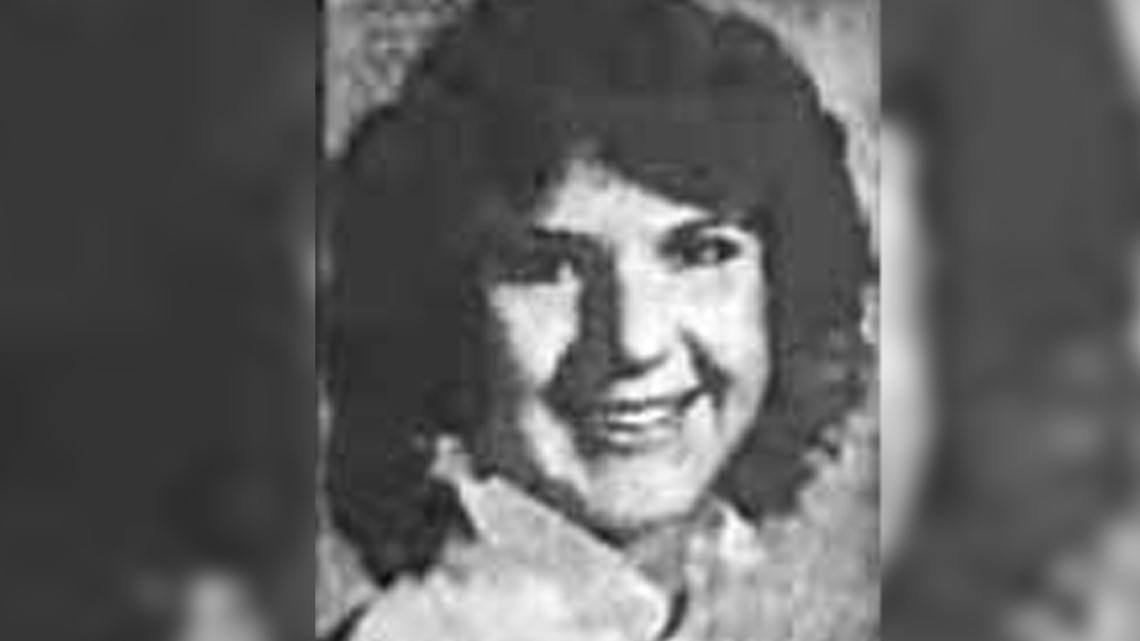
Investigators loosely considered, but never officially pursued, the possibility that Hall may have been involved with Schmidt’s disappearance.
"I just think that based on his suspected involvement in numerous homicides that, as a general course of action, his name came up. I don't know how much they explored that other than his name hit everybody's radar," Detective Eager said.
Authorities loosely considered the possibility that Hall had been in the West Lafayette area because of the popular historical reenactment festival, Feast of the Hunters' Moon.
But that theory never quite held up to Eager, because Feast of the Hunters' Moon doesn’t happen until October. It was that way in 1985 as well.
"Her disappearance was way too early for that. I don't know that there would have been any reenactors in the area for anything at that time that I was aware of," said Eager.
At her family’s request, Schmidt was declared legally dead in 1993.
Detective Eager has kept in contact with her family over the years, and said her disappearance is not something they have gotten over.
"Her mother told me that she thinks about it, and has thought about it, every day of her life since it happened. It's nothing that people ever get over," Eager said.
Anyone with information is encouraged to call WETIP at 1-800-78CRIME or the West Lafayette Police Department at 765-775-5200.
Wendy Louise Felton, 16
Wendy Louise Felton was reported missing the early morning of June 5, 1987.
Her sister had driven her parents to the airport for a trip and, when she returned home, Felton was gone.
When authorities went to the family's home in Marion, Indiana, it didn't look too amiss – other than a missing suitcase and clothes. Initially police thought Felton had run away from home, but eventually found foul play was connected to her disappearance.
Throughout the years, authorities have received various tips about possible sightings of Felton and potential burial locations.
Police received a tip that someone had seen Felton as recently as 2017, but have not gotten any since then.
"You kind of never give up hope. You always kind of want to find some closure or one way or another for the family," said Lt. Jason Ewer with the Grant County Sheriff's Office.
Similarly to the case of Jennifer Lee Schmidt, Grant County detectives did not discover any evidence, tangible or circumstantial, connecting Hall to Felton's disappearance.
But the potential scope of his crimes, and the fact that he was heavily associated with the later disappearance of Tricia Reitler, means police can't rule him out – even as they don't officially pursue him as a suspect.
"I don't think he ever admitted to Wendy at all, that I've seen. Otherwise we'd have probably been going somewhere else by now," said Ewer.
The disappearance of Wendy Louise Felton is still unsolved. Anyone with information is encouraged to call CRIMESTOPPERS at 1-800-222-TIPS.
Denise Diane Pflum, 17
In 1989, Connersville senior Denise Diane Pflum was headed to Miami University on a track scholarship, and planning to study microbiology when she vanished on Good Friday.
“She was scary smart. She was one of these kids that just almost had a photographic memory. She learned things so quickly. Highly intelligent, talented athlete, talented artist. She just had everything going for her,” said Judy Pflum, her mother.

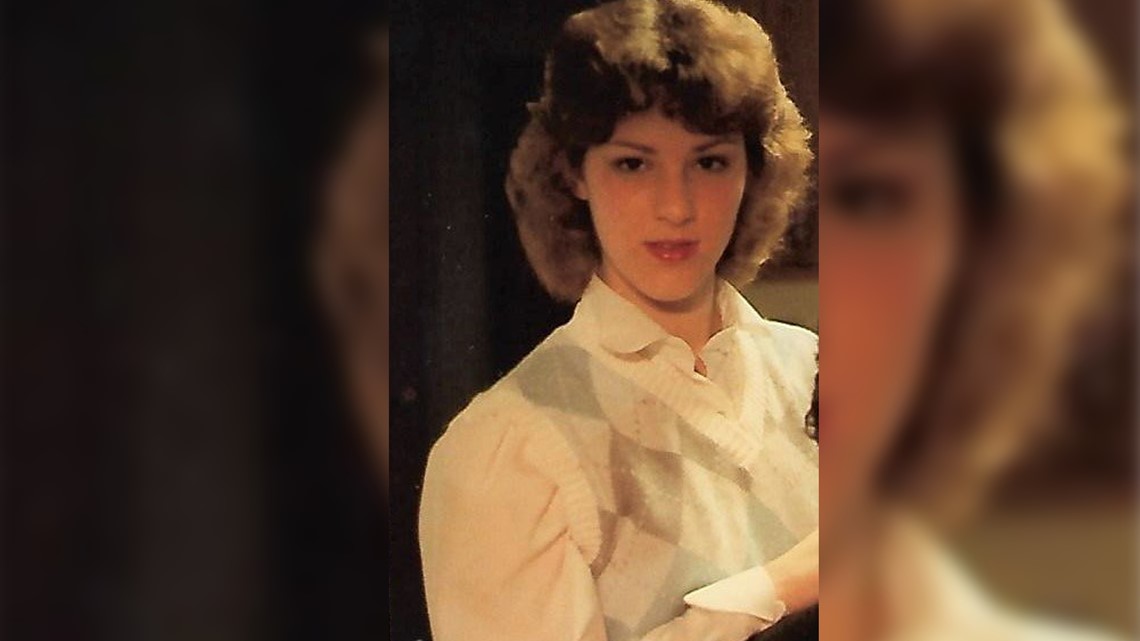
The Thursday night of Connersville High School's spring break, Pflum had gathered at a home on the outskirts of Connersville with friends and classmates for a bonfire. When she woke up at her home the next morning, she realized she forgot her purse at that house.
Judy still remembers her daughter's hesitancy to return to the home alone.
"She seemed to be apprehensive about going by herself. But she was not a person who was normally afraid to go. So, we've puzzled over that all these years," Pflum said.
Denise left to retrieve the purse and was never seen again. She missed a boy who went to her home, with her purse in hand, by about an hour.
After they hadn’t heard from their daughter through that evening, the Pflums reported her missing. Authorities eventually found her locked, cream colored 1981 Buick Regal in a remote part of the county that same night.
At that point though, authorities didn't really start working her disappearance as a missing person’s case. It’s the first of many decisions made by investigators back then that puzzles detectives still working the Pflum case.
Sheriff Joey Laughlin with the Fayette County Police Department said investigators initially suspected Pflum ran away, without any actual evidence that she had done so.
“She had a good home life, she didn't have any reason to run away. She wasn't unhappy with anything. So, that was the initial thing. We handle that differently now. There's still several times that that is the case that maybe a kid's just not returned home or whatever. But we, we don't err on the side or on I just ran away. We're not gonna worry about it,” Laughlin said.
He believes two major pieces of evidence mishandled by earlier investigators - fingerprints from inside the car which somehow were lost, and a red handkerchief that showed up at the scene of the car the next morning - could have played a key role in finding out what happened to Denise.
Laughlin said he checked with three different police agencies, state labs, and the Indiana State Police to try and track down the fingerprints to no avail.
"It's like having a puzzle that you're trying to put together, with numerous missing pieces. And the pieces that we initially did have, we don't have anymore. I would love to have those fingerprints," Laughlin said.
Judy believes whoever killed her daughter still lives in the community – a man who was on detectives' radar from the early days of their investigation into Pflum's disappearance.
13News is not naming that person, because they have not been charged with a crime, but police heard through several tips from the community that this man told people he killed Denise.
"He lawyered up, so to speak, and would not consent to an interview. So, I never had the opportunity to really talk to him in person," Laughlin said.
Larry Hall didn't come on the radar until years later, when Laughlin reopened the case and found records of a meeting IMPD detectives had with Hall.
"Hall, at some point, made some admission to being involved with numerous girls' that have disappeared. Denise's name was listed by Hall, that's when I started to follow up," said Laughlin.
Fayette County investigators went to Illinois, where Hall was incarcerated in 2018, but he denied having anything to do with Denise's disappearance.
"We did even offer him the, hey will give you immunity on this one. Just tell us where she's at, and where she's buried. He kind of got super, super timid. But then, he did get fired up when we did try to offer it to him," Laughlin said.
Hall would not be the only suspect who recanted a confession in Denise Pflum's case.
In 2020, her ex-boyfriend at the time of her disappearance, Shawn McClung, confessed to killing her while he was incarcerated on fraud charges. He was charged with her murder in July 2020, but died in September that same year.
However, while Judy Pflum believes McClung was not properly investigated at the time of her daughter's disappearance, she doesn't believe he killed Denise.
"I'm not totally forgetting [Hall]. But I'm focusing more on the people who have confessed numerous times, while he has maybe written her name down or underlined her name on a list," Pflum said. "And Hall is locked up. He's not going anywhere."
The disappearance of Denise Pflum remains unsolved. Anyone with more information is encouraged to call CRIMESTOPPERS at 1-800-222-TIPS.
Michelle Dewey, 20
In 2009, WTHR’s Scott Swan sat down with Hall’s twin brother, Gary, who believes to this day his brother killed 20-year old Michelle Dewey in 1991.
On July 1, 1991 Michelle Dewey was sunbathing in the backyard of her Irvington home on South Downey Avenue. She was at home with her 1-year-old son.
"Michelle was sitting in the lawn chair and Willie was playing in the little wading pool," recalled Michelle's aunt Jane Bray.
That idyllic setting would soon become a crime scene. The young mother was found strangled. Her son was left unharmed inside the home. The discovery was made by a young babysitter who called police.
Family members remember getting the horrible news and arriving at the scene.


"It was taped off by the police. The detectives walked up and told me that she was dead," recalled Bray. Police investigated Michelle's death, but made no arrests. Initially, family members believed Michelle was murdered by someone she knew.
Michelle's son, Will Prescott, grew up wondering who killed his mother.
"I ask myself why," Prescott says. "Did this person have feelings for me to keep me alive?"
Gary Hall is convinced his twin brother is the killer.
"I believe Larry killed Michelle," says Gary Hall. "I believe he killed a lot of young women, I'm sorry to say."
Gary Hall says he visited his brother in prison in March, 2009 and convinced his brother to speak with detectives investigating the Dewey murder.
"Larry confessed that he was in the Irvington area of Indianapolis on July 1, 1991," says Gary Hall. Larry Hall, according to his brother, had driven to Irvington to check out a blue Dodge van listed in a Trader newspaper.
"He drove by Michelle Dewey. She was laying out," says Hall about his brother's reported confession.
ORIGINAL ARTICLE: Who killed Michelle Dewey?
Hall says his brother barged in the door of the home, strangled Michelle Dewey and left when the young boy began to scream and cry.
"Larry said it freaked him out," says Gary Hall. His twin brother reportedly took a record album from Dewey's residence. "He grabbed it as a souvenir," says Gary Hall.
Gary Hall said his twin-brother's confessions did not stop with the Michelle Dewey murder.
"He confessed that his first killing was in 1979," says Gary Hall.
Hall said his twin brother admitted killing a hitch-hiker and burying the body near the Mississinewa River.
"He confessed to 15 murders," he said.
Hall said the confessed murders took place in California, Colorado, Illinois, Missouri and Wyoming.
"I don't believe he's making any of this up. He's got too many specific details," Gary said.
"He was attracted to young, long dark-haired women, 5-foot-3 to 5-foot, 5 inches in height, with a slender, athletic build," Gary said.
Hall told 13News at the time he only came forward with information about his twin brother's confession for one reason.
"We're searching for the truth," Gary said.
Gary believed there were victims whose bodies have not yet been discovered, and families still waiting to find their loved ones.
"We want closure for the families. We want the victims all brought home, every last one of them," Gary said.
The reported police interest in Larry D. Hall has prompted questions from the family of Michelle Dewey.
"We were informed that it could have been a serial killer," said Bonnie Smith, Michelle's mother.
"I'm hoping it's the guy they have already because he's been there for several years and that means he's had less chance of hurting someone else," says Michelle's aunt Jane Bray.
"People like him that hurt people just because they can't think of anything else they'd rather do, destroys families," says Bray.
Family members believe Michelle fought off her attacker and have been told by police that DNA collected at the crime scene 18 years ago is undergoing testing.
"She had long, pretty nails," says Michelle's sister Jennifer Coulter-Lissman. "I know the DNA they collected would have been under those pretty nails. Whatever DNA she had underneath her fingernails, Michelle's going to solve it."
If or when the Michelle Dewey murder is solved, one person who deeply wants to know is the person who never really knew her.
"I'm always thinking of my mom," Prescott said of his mother.
"He will never know how much she loved him. He will never be able to comprehend how she lived for him every single day," says Michelle's sister Jennifer Coulter-Lissman. "I think he above all people, he needs to know."
Indianapolis cold case detectives think an advertisement in the Trader Magazine might help them solve the crime.
A 1980 blue Dodge van was advertised for sale in the Trader in June 1991. It mentioned the van's blue interior, a 318 engine and an asking price of $1,500. Police want to know who sold the van or placed the ad.
Police are also looking for a copy of the Trader, June 20-29, 1991. If you have information, please call IMPD.
Rayna Rison, 16
Rayna Rison was last seen leaving the Pine Lake Animal Hospital in LaPorte on March 26, 1993. Throughout the next several weeks, investigators would locate Rison’s letter jacket in a tree, and car on a back country road.
One month after her disappearance, Rison’s body was found in a small pond in northern LaPorte County. She was fully clothed, and the LaPorte County Coroner reported at the time they did not find evidence that she was raped or sexually assaulted.
Authorities fast identified Rayna’s brother-in-law, Raymond McCarty, as a suspect in her death.
When Rayna was 12, she allegedly had an abortion after becoming pregnant through alleged sexual relations with McCartny. She told authorities she had sexual contact with McCartny for months prior to the abortion.
Court documents obtained by The South Bend Tribune reported Rayna said her brother-in-law threatened to kill her if she ever told anyone what happened. McCartny denied that claim, but he pleaded guilty to Class D Felony child molestation charges in 1989 and was sentenced to three years probation.
He was released in Jan. 1993, less than three months before Rayna’s murder.
However, that same report from The South Bend Tribune showed McCartny’s case was eventually dismissed due to "lack of evidence." He was released from jail after 14 months.
By November 1994, authorities were questioning Larry Hall in Illinois about abductions of women and young girls across the Midwest.
When LaPorte police went to Illinois to collaborate with investigators about a potential tie between Rison’s death and Larry Hall, they found Hall had birth control pills labeled with her name. Her family denied that she took birth control pills.
It's still unclear whether Hall obtained those pills, then wrote Rayna’s name on them when he knew she had been missing or whether they actually belonged to Rayna.
Rison's case was unsolved from 1993 to 2015, when her ex-boyfriend was convicted of her murder by a LaPorte County Court.
In 2015, Rison's ex-boyfriend Jason Tibbs was found guilty of strangling her to death. He was sentenced to 40 years in prison, but he maintained his innocence. His appeal was denied in 2016.
Tricia Reitler, 19
For decades, investigators have not been able to figure out which is true – did Larry Hall kill Jessica Roach, then Tricia Reitler? Or did he use the murder of Tricia Reitler as inspiration to kill Jessica Roach?
The evening of March 29, 1993, Reitler had decided to take a break from writing a term paper at Indiana Wesleyan University in Marion. She went down to a local Marsh and purchased a magazine and root beer.
She vanished shortly after. The following day, her jeans, shirt and shoes were found in a field near Seybold Park and Center Elementary School. That’s between campus and the Marsh Supermarket where she took a study break the previous day.

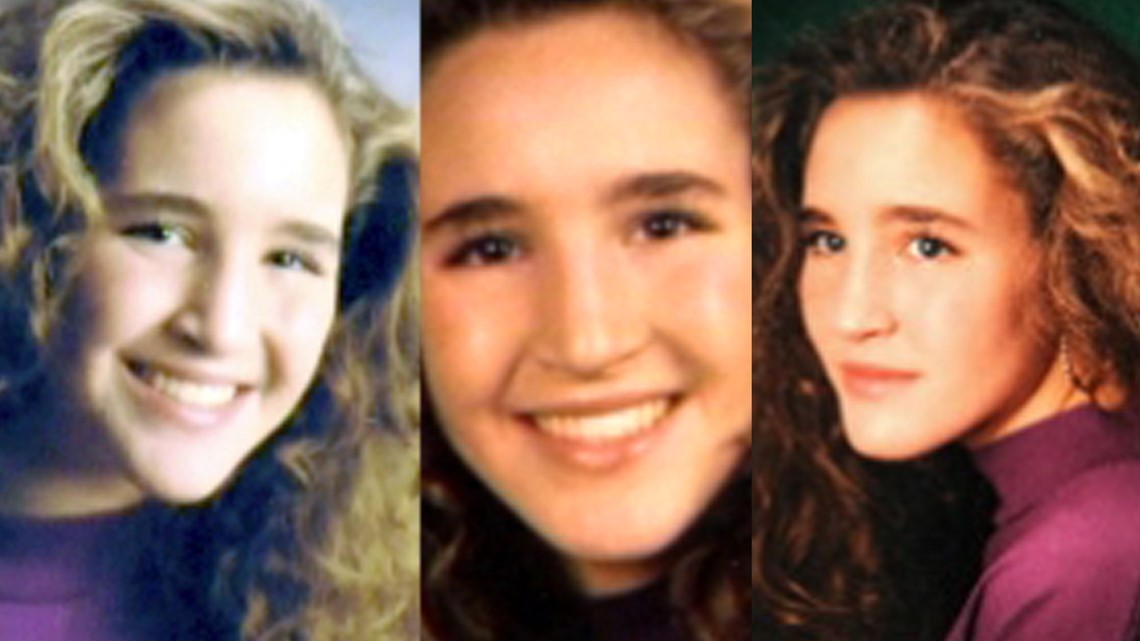
Just days after Hall’s disappearance, authorities discovered Hall was on campus at Indiana Wesleyan University. A former student reported he had followed her in his van.
After Jessica Roach was found dead, authorities then discovered maps, photos and newspaper articles concerning Reitler's disappearance inside Hall's van.
He signed a statement confessing to her kidnapping and murder, telling police he strangled Reitler with a belt, raped her, and left her body in a creek.
He later recanted that confession, and was never charged in connection with Reitler's disappearance due to lack of evidence.
At one point, investigators searched an area of Grant County, Indiana near the Mississinewa Reservoir for Reitler's body. Hall led them to the scene, saying he'd buried her body there, but no evidence was located.
The disappearance of Tricia Reitler remains unsolved. Anyone with information is encouraged to call CRIMESTOPPERS at 1-800-222-TIPS.

